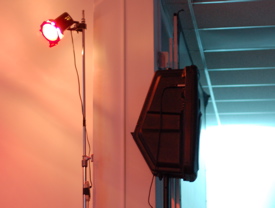
Last night, during a long and winding conversation about music, genre, emotional vs. intellectual processing and cross-derivatives of the two, etc., we wondered aloud about the ways we use music in our personal lives as opposed to the professional. How can you love this? How can you not? Do you pay more attention to the music or the lyrical content? Oh, really, well that explains it!–You know, that sort of thing.
Later on, we specifically spoke about how we use it to decorate the fantasy space in our heads that houses the lives we live and, perhaps of even greater concern, the lives we aspire to. How important is the music itself, and how important is what we feel the music and its extra-musical trappings say about the type of person we are? It’s loosely similar to what reading some particular magazine in public might project. It’s a fool who reads a magazine only so strangers will see and think her a certain type of person, but there is a certain type of person who holds it and knows that others, if they glance her way, will know her for what she is inside. It represents her and her values. If that feels adolescent to you, substitute the type of car you drive, clothes you wear, whatever thing or activity you use to define who you are to the world, even if no one is explicitly paying you any attention whatsoever.
Towards the end of the evening, the question we finally got around to was: Why is this the kind of music that you feel most attached to? The “this” varied by respondent, but the answer distilled down neatly. There are lots of people in the world, many you’d share lunch or a drink with a few times a year and have a very grand time. But only a select group, when gathered close around you, feels truly like home.
With that we ate the last of the peanuts in the dish and cashed out.

Christopher Small says (yes, this is my latest obsession):
I can’t find the exact quote at the moment but basically at some point he says something to the effect of, we are attracted to the kinds of music, the types of musicking that express the values and relationships we wish to explore. So, my guess is that if you want to know why you’re listening to the music you’re listening to, you have to explore what values you hold and wish to hold.
Molly says: Thanks, Andrea. I really need to get a hold of these books. For those of us interested in digging deeper, what would you recommend starting with?
I love this conversation for so many reasons.
First, I can say from sitting at the piano that my understanding of myself has grown through the connection to studying certain pieces. A specific example would be Brahms Cap. in f#m. It taught me a lot about my relationship with myself. It provided the slap in the face I needed to understand an internal tug of war.
My great affinity for electronic music has been part of me since I was 12… It has always provided a stable, minimalistic backdrop to my complicated life. It was a retreat from the classical structure I use at the piano. It’s the electronic genre that allows me to practice creative visualization for life. Self evolution.
Christopher Small has three books; in chronological order they are: Music, Education, Society; Music of the Common Tongue; and Musicking. I’ve been reading them in backwards order (I still have to go through M/E/S). They articulate a lot of things I’ve been thinking about, but didn’t know how to articulate. There’s a lot of controversial material in them and not everything he says is absolutely golden, but for the most part, it’s really hit me where I live.
Here’s an interview of him that Robert Christgau conducted:
http://www.furious.com/PERFECT/chrissmall.html
Music is everywhere and its an part of life which you can’t separate from yourselves . Its with you from the day you take birth and you cry for the first time . There is a music in that too . its an important part of our society